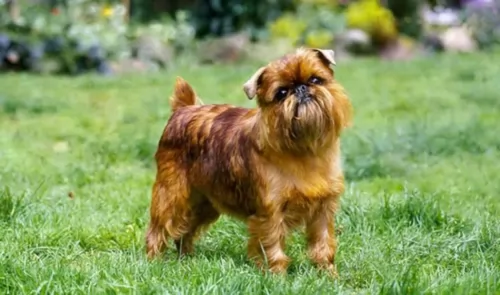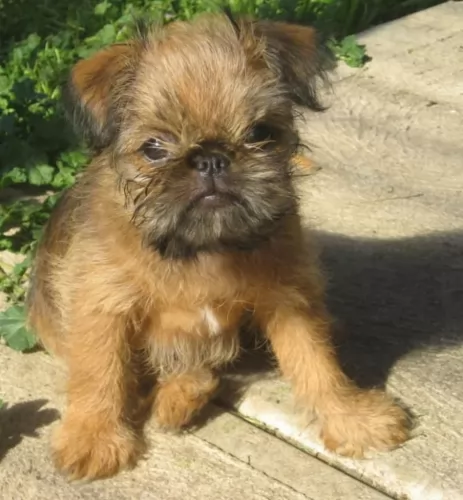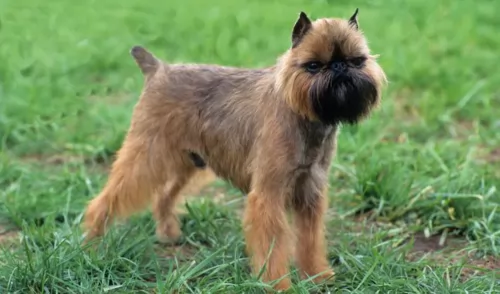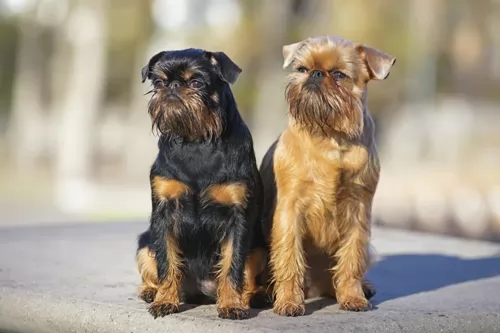 Petzlover
Petzlover Belgian Griffon is originated from Belgium but Mexican Hairless is originated from Mexico. Belgian Griffon may grow 38 cm / 14 inches shorter than Mexican Hairless. Belgian Griffon may weigh 16 kg / 35 pounds lesser than Mexican Hairless. Belgian Griffon may live 5 years less than Mexican Hairless. Both Belgian Griffon and Mexican Hairless has almost same litter size. Belgian Griffon requires Moderate Maintenance. But Mexican Hairless requires Low Maintenance
Belgian Griffon is originated from Belgium but Mexican Hairless is originated from Mexico. Belgian Griffon may grow 38 cm / 14 inches shorter than Mexican Hairless. Belgian Griffon may weigh 16 kg / 35 pounds lesser than Mexican Hairless. Belgian Griffon may live 5 years less than Mexican Hairless. Both Belgian Griffon and Mexican Hairless has almost same litter size. Belgian Griffon requires Moderate Maintenance. But Mexican Hairless requires Low Maintenance
 The Belgian Griffon isn’t your most attractive dog, but maybe its his quirky, gremlin looks that makes him such an adored pet for many. There are different varieties of Griffon, and the Belgian- and Brussels Griffon are one and the same. All small Belgian dogs have the same breed standards, with the Belgian having a rough coat The dog hails from Belguim and its ancestors were no doubt a mix of the Belgian street dog, the Stable Griffon and the Affenpinscher.
The Belgian Griffon isn’t your most attractive dog, but maybe its his quirky, gremlin looks that makes him such an adored pet for many. There are different varieties of Griffon, and the Belgian- and Brussels Griffon are one and the same. All small Belgian dogs have the same breed standards, with the Belgian having a rough coat The dog hails from Belguim and its ancestors were no doubt a mix of the Belgian street dog, the Stable Griffon and the Affenpinscher.
Later on in the 1800s, this combination was then crossed with the Pug, giving the dog the brachycephalic or flat faced look.
Unfortunately no written records were kept about the precise origin of this breed, but there is also the idea that the King Charles- and English Toy Spaniel were also involved in its development. These small dogs were bred to catch rats in the barns of European estates.
 Who can believe that the origin of these dogs which hail from Mexico, goes back more than 3,500 years?
Who can believe that the origin of these dogs which hail from Mexico, goes back more than 3,500 years?
Known as the Xoloitzcuintli dog or Xolo for short, they comes in different sizes – toy-, miniature and standard which means there are different sizes. Both coated- and hairless dogs can be found in the same litter.
There was a time when the dog nearly became extinct buts its numbers have recovered. This is no doubt because there was a time when the natives ate the dog’s flesh.
 There are different variations of this dog to give it its distinctive look and size. This quaint looking little Griffon canine comes with two different coat types - soft or wiry. With the Belgian Griffon, his wiry coat of red, tan or black will need to be brushed at least twice a week. Shedding with this dog is seasonal.
There are different variations of this dog to give it its distinctive look and size. This quaint looking little Griffon canine comes with two different coat types - soft or wiry. With the Belgian Griffon, his wiry coat of red, tan or black will need to be brushed at least twice a week. Shedding with this dog is seasonal.
He has a compact, sturdy little body, and he trots around with attitude. With his sharp pointed ears and whiskers, he has been given the nickname ‘bearded dog’. His dark black eyes are alert. He is self-confident, intelligent and curious breed, a great family pet and good with children if he has grown up with them in the home. He is good with other pets. The fact that this is a small breed and that he doesn’t have excessive energy levels, means he is adaptable to city- and country living.
 The Mexican Hairless is truly an ancient dog breed of the Americans. He stands at 35 – 58cm if he is the standard variety whereas the miniature will stand at up to 35cm. Weight can vary too, but with the standard variety, you're talking about 16 to 22kg.
The Mexican Hairless is truly an ancient dog breed of the Americans. He stands at 35 – 58cm if he is the standard variety whereas the miniature will stand at up to 35cm. Weight can vary too, but with the standard variety, you're talking about 16 to 22kg.
It has faced times of nearly being extinct but it’s numbers have recovered, and the dog is often sought after for those who suffer with dog-hair allergies. You could say that this dog’s most notable characteristic is its lack of hair and the soft skin.
Some of them have small tufts of hair on the hair, mostly around the top of the head. The skin can be various shades of gray to bronze and a yellowish color too. His body is slightly longer than its height and he is slim and well muscled. The tail is long and thin and is sometimes carried high. You can expect 2 – 5 puppies from these dogs.
Anyone acquiring a Xolo will discover that this is an intelligent dog breed and that just like with other dogs, you’ll be able to have him trained and socialized easily. Then he is obedient and a pleasure to have around.
He is active too and will require games with balls and ropes as well as a daily walk. The Xoloitzcuintli is noted for its calm demeanor. The puppies are a lot noisier than the adults and very energetic and this continues till they are about 2 years of age when they are considered to be adult.
Well raised Xolos form strong bonds with their human family, becoming loyal and devoted.
 The Belgian Griffon is an affectionate pet and often establishes a strong bond with one member of the family. You’ll have your Griffon with you for about 15 years so make sure he is trained and a pleasure to have around.They are difficult to train, being somewhat stubborn so they are going to require patience. They’re sensitive too, and they won’t respond well to aggressive treatment.
The Belgian Griffon is an affectionate pet and often establishes a strong bond with one member of the family. You’ll have your Griffon with you for about 15 years so make sure he is trained and a pleasure to have around.They are difficult to train, being somewhat stubborn so they are going to require patience. They’re sensitive too, and they won’t respond well to aggressive treatment.
They’re much more indoor dogs than outdoor dogs because they’re also vulnerable to heat stroke. They just want to come indoors and be with their human family, and when you do that for them, they’ll become a wonderful friend and companion to you.
 The Xolo is one of those dogs who don’t get ill easily. He is also intelligent and fairly easy to train. Add to that the fact that he is also a low maintenance dog as he doesn’t have a coat that needs brushing and grooming.
The Xolo is one of those dogs who don’t get ill easily. He is also intelligent and fairly easy to train. Add to that the fact that he is also a low maintenance dog as he doesn’t have a coat that needs brushing and grooming.
Give your Xolo lots of attention because in exchange for the good care you give him, you’re going to get a loyal, devoted pet who loves to be with you constantly.
 When you get your Griffon from a reputable breeder, you always have a better chance that he’ll be healthy. As it is, the Belgian Griffon has few hereditary health issues. However his dark eyes will have some genetic problems to contend with and he could suffer with progressive retinal atrophy. This is an illness which can lead to blindness
When you get your Griffon from a reputable breeder, you always have a better chance that he’ll be healthy. As it is, the Belgian Griffon has few hereditary health issues. However his dark eyes will have some genetic problems to contend with and he could suffer with progressive retinal atrophy. This is an illness which can lead to blindness
Syringomyelia – this is a neurological condition – an abnormality of the spinal cord – a disease which occurs more frequently in small breeds. It can cause your pet to endure a lot of pain.
Birthing Issues - these little dogs often have problems with giving birth, and a vet often has to intervene and perform a cesarean.
 The Xoloitzcuintli is a hardy dog in terms of health and can live to a ripe old age in dog years – some have been known to reach 18, 19 and 20 years of age. Without a coat, this dog is susceptible to sunburn so care must be taken when outdoors.
The Xoloitzcuintli is a hardy dog in terms of health and can live to a ripe old age in dog years – some have been known to reach 18, 19 and 20 years of age. Without a coat, this dog is susceptible to sunburn so care must be taken when outdoors.
Hairless dogs tend to battle with skin problems such as pimples. Skin allergies can cause itching and scratching and these can lead to bacterial infections. It is interesting to note that the genes that bring about hairlessness also produce troublesome teeth, so that dental disease is quite rife with these dogs.
 The Belgian Griffon will do well if you invest in high quality foods. You can make your own, but if you’re concerned about his health, it would be best to check what ingredients should go into his home-prepared meals to ensure he gets all the vitamins and minerals he needs.
The Belgian Griffon will do well if you invest in high quality foods. You can make your own, but if you’re concerned about his health, it would be best to check what ingredients should go into his home-prepared meals to ensure he gets all the vitamins and minerals he needs.
If you want to go with commercially manufactured dog foods, check with your vet about wet- and dry foods. Your vet will help with choosing a food appropriate to his size and age. Always ensure that there is clean, fresh water available to your pet.
Even though he is a small breed, he is fairly active and he will need his fair share of exercise like ball games and walks. Training and socialization are a must for him. You’ll notice that training isn’t particularly easy with this breed, and first time dog owners might not have the patience with him.
 You’ve got to remember with this dog breed that he doesn’t have a coat so he can burn easily when out in the sun. If you know you’ll be in the sun for long, you’ll have to apply special sunscreen.
You’ve got to remember with this dog breed that he doesn’t have a coat so he can burn easily when out in the sun. If you know you’ll be in the sun for long, you’ll have to apply special sunscreen.
You can wipe down your Xolo or bath him from time to time, though not to often so as to strip the natural oils from the dog’s body. The nails will need to be trimmed regularly, as long nails can be a danger as they can hook on things and cause pain and bleeding.
Provide your hairless pet with a nice, soft bed to lie on.
Take him to the vet when he appears to be ill and see that you get his vaccinations done to prevent deadly illnesses such as rabies and parvo.
Check his eyes and ears for infections.
Brush his teeth to remove plaque. Never use human toothpaste. Take a look at the different canine toothpastes available.
Never leave your pet in a hot car with no windows open.
Provide your Xoloitzcuintli dog with high quality dog food so as to enhance health and longevity. Keep food simple for your pet to avoid digestive problems. Boiled chicken, brown rice or pasta and cooked potato, carrots and spinach can be chopped up and added to his dry kibble from time to time. Also a little bit of raw meat added in occasionally can also be excellent. Avoid feeding your pet foods such as onions, avocados, nuts, chocolate, coffee and raisins.
Make sure this dog has access to cool, fresh water night and day.